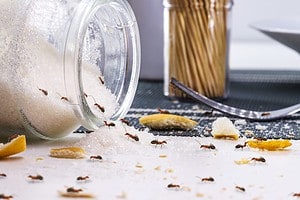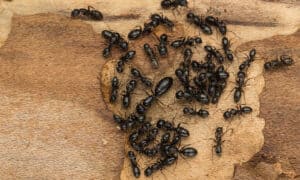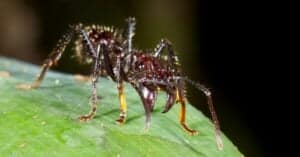There’s no feeling like the pit you get in your stomach upon discovering that your once spotless kitchen has become overrun by ants. It can be an overwhelming experience, and it may be hard to decipher where to begin with these creepy crawlies. While there may be several chemical solutions on the market, sometimes the best solution is one you can create all on your own. In this article, we’ll show you the best homemade ant trap, as well as several more versatile options. If you’re ready to rid your home of these unwelcome guests, let’s get started.
What Causes Ant Infestations?
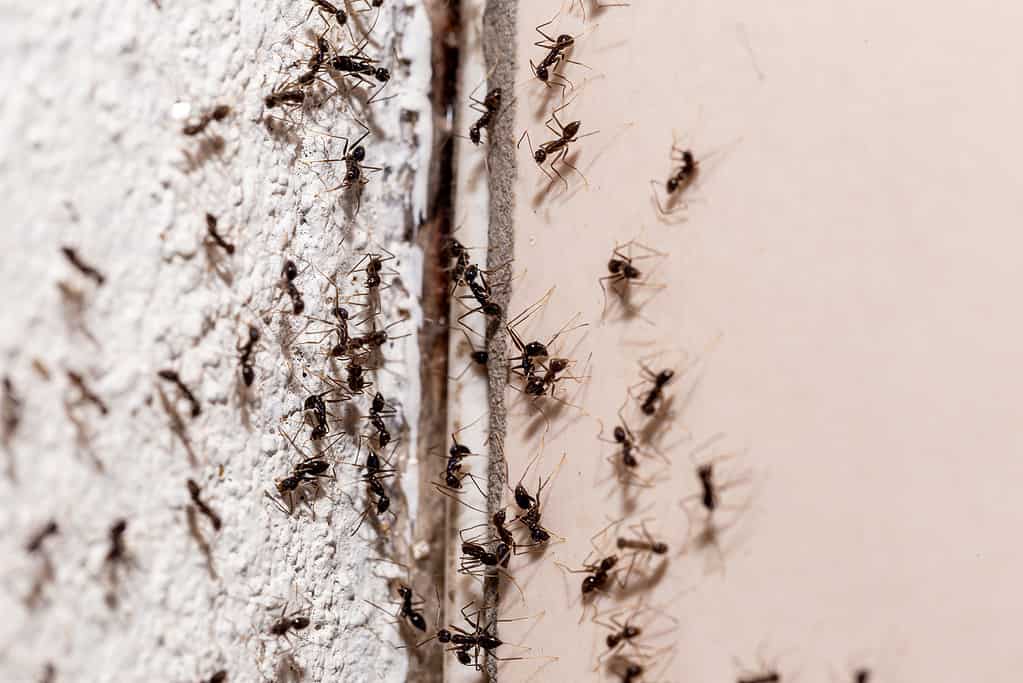
Ant infestation coming through a crack in the wall.
©iStock.com/RHJ
Before you start getting rid of your ant infestation, you should try to understand how it manifested. Unless you’re able to solve the root cause of your new houseguests, they may begin reappearing as soon as you’re done clearing out the first colony. The reasons why ants are attracted to your home can vary, but here are some of the most common:
- There’s Food Left Out: Ants are hungry bugs. They’re always looking for more food, and if you aren’t thoroughly cleaning out those crumbs, you’re basically welcoming them into an all-you-can-eat buffet. Make sure you’re regularly cleaning up after your meals. Another good tip is to leave out some bay leaves, as ants hate the smell.
- Your Garbage Is Sticky: Trashcans aren’t the first thing you think to clean out, but they can be some of the most important. Even if there’s no sticky food on your counter, ants will certainly seek out that sweet stuff in your garbage can. Make sure to regularly clean them out, especially if you’ve been drinking a lot of soda!
- Your House Has Decaying Wood: If there’s something that ants like, it’s wet wood. If you live in an area prone to storms or have leaky pipes, things can get bad. Carpenter ants adore moist wood when making their nests. Try to keep an eye on rotting wood and replace it as necessary. Another way to help out this issue is to store firewood far away from the home.
Why You Should Use Homemade Ant Traps
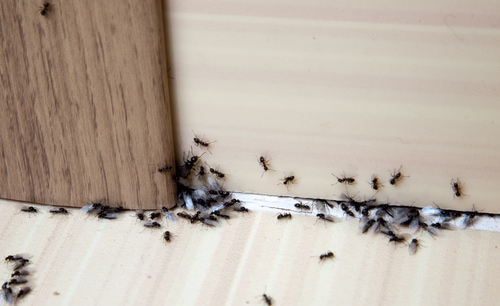
Chemical traps might seem appealing, but they can be more trouble than they’re worth.
©Cherkas/Shutterstock.com
Since there are so many chemical solutions to ant infestations on the market, why should you even bother trying to figure out the best homemade ant trap? Unfortunately, products that advertise themselves as simple solutions can sometimes come with unintended effects. There are several reasons why you should probably be wary of non-homemade traps.
First off, many store-bought chemicals contain toxins that can be harmful if ingested, inhaled, or so much as touch your skin. When you make your own ant trap, you know exactly what’s going into it. This transparency is not always available with store-bought products, which might not disclose all their ingredients or might contain complex chemicals. These chemicals are often quite harmful if misused and could pose a toxic threat to children, pets, or even adults in some cases.
There are reasons that fall even beyond the realm of safety. For instance, you’re sure to save a lot more money by opting for a homemade solution. The ingredients to these traps are items that can be found in most households already, so making one would come at practically no cost. Another added bonus is that many homemade traps are environmentally friendly. So you aren’t just helping yourself, but also helping Earth!
The Best Homemade Ant Trap
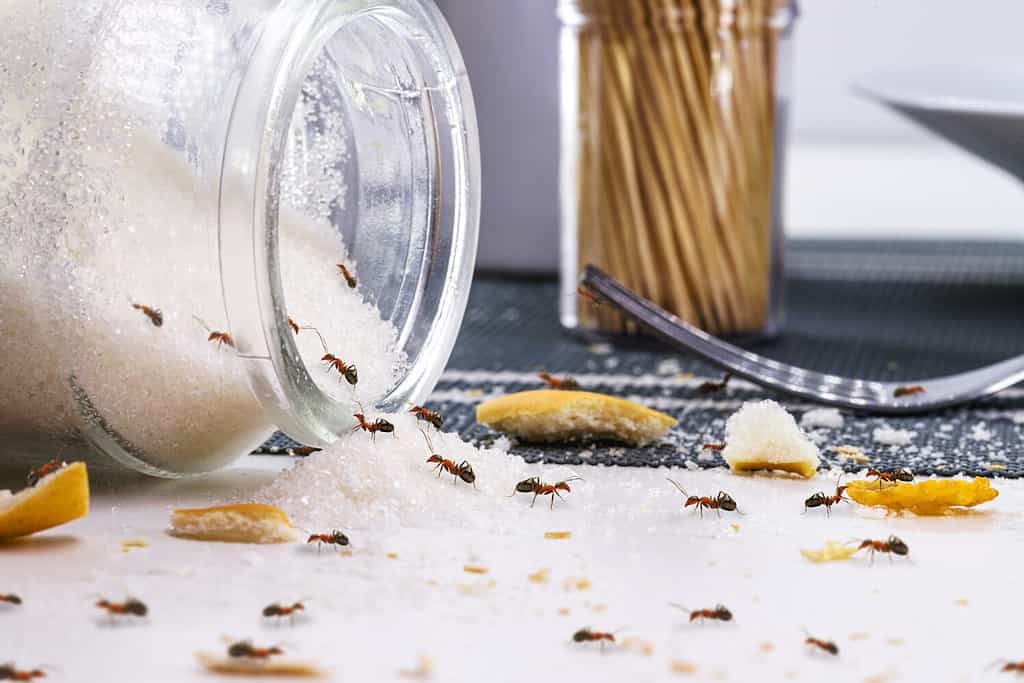
Mixing borax and sugar is a recipe for the best homemade ant trap.
©RHJPhtotos/Shutterstock.com
Though this is an answer that is naturally subjective, it seems that many have come to the conclusion that the most efficient and all-around best homemade ant trap is the combination of sugar and borax. Ants are naturally attracted to sugary substances, so anything from regular sugar to honey would work fine for these purposes. Borax, the star of the show, is toxic to ants. However, when used in modest amounts and under supervision, it is safe for humans and pets. These two ingredients team up to create a deadly combination for the unwanted insects.
Steps
- Mix together one cup of sugar and three tablespoons of borax. Continue stirring until everything has been fully dissolved.
- Use items like small sponges or cotton balls to soak in the mixture. Then, place these saturated pieces onto a shallow lid or dish.
- Take this dish, and place it in an area that you see the ants frequenting. Try to find a spot dense with ants but secluded from any pets or small children.
- Wait for them to take the bait! As the cotton balls disappear, replenish the dish as needed.
Why It Works
You see, this method is a way to infiltrate the ants from the outside. When the ants pick up the bait, it won’t hurt them immediately upon contact. Only when ingested will the solution become toxic to the ants. When they bring this bait to the rest of their colony, and specifically to the queen ant, they will begin to suffer the effects of the bait. That is why this is considered one of the best homemade ant traps.
Following Up On The Trap
Once you’ve set them up, try to monitor the activity of the ants for a few days to about a week. Take note of the number of ants you still see active- the less there are, the more you know it’s working. If you happen to see that the ants are staying the same in number, you might need to adjust your recipe.
Remember, while this trap is useful for many types of common household ants, some species might prefer protein-based baits over sugary ones. If you suspect you’re dealing with such ants, you can make a similar bait using peanut butter and borax.
Other Kinds of Homemade Ant Traps
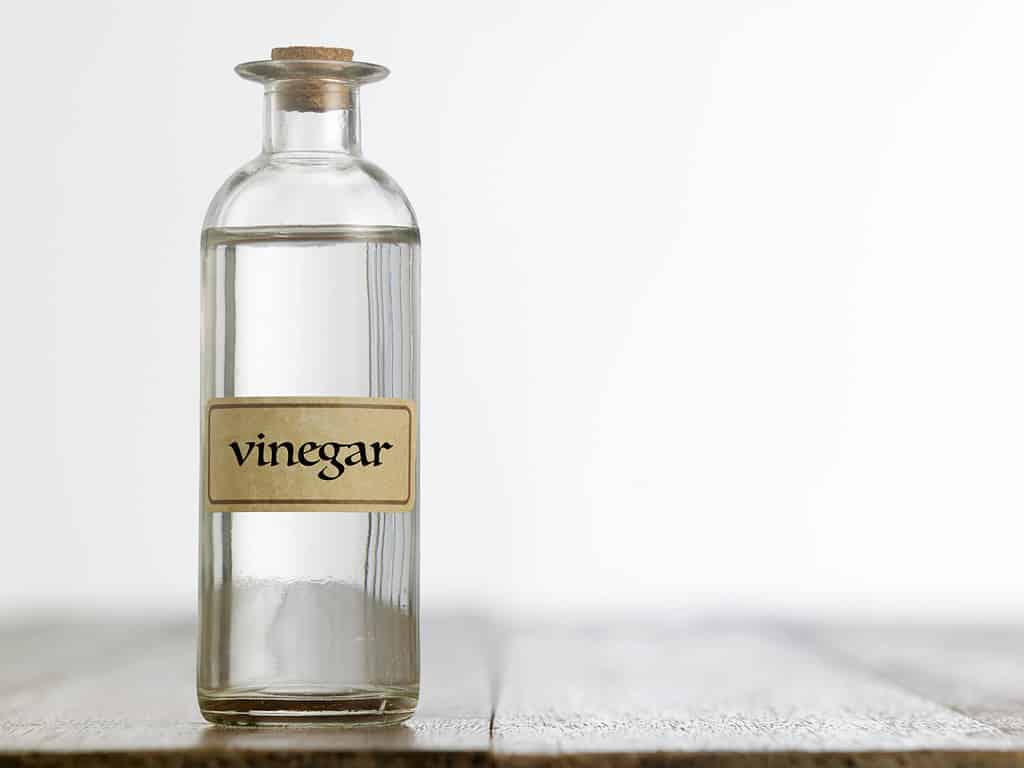
Vinegar, lemon juice, and pepper are all other household ingredients that make excellent defenders against ants.
©focal point/Shutterstock.com
While the sugar-borax bait trap is very popular and widely considered to be the best homemade ant trap, there are certainly others that are strong contenders for this title. All of these traps are made of ingredients safe for humans to interact with and be around, so no need to worry about harmful side effects. Here is some information on other homemade ant traps that do an effective job of destroying ant infestations.
Vinegar Disruptor
By using a combination of vinegar, baking soda, and dish soap, you can create a solution that ants adamantly dislike. It disrupts the trails that ants create with their pheromones, in tandem making it more difficult for them to get back to the colony or communicate with one another. Lost and confused, these ants are going to have a hard time making it through the predicament.
Lemon Juice Spray
Sometimes, you need to get up close and personal instead of lying in wait. That is exactly the kind of offensive attack achieved with this lemon juice spray. Using three parts lemon juice and one part water, you won’t just be able to get rid of them but also repel them from your space entirely. By using this spray on windowsills and other known ant entry points, you can completely deter them from coming around.
A Sprinkle of Pepper
Our last homemade ant trap is a one-ingredient fix for minor infestations. Ground pepper, which is surely found right inside your spice cabinet, has a smell that ants are not fans of. This scent repels ants from your home when sprinkled near their common entry points. It can also be thrown under counters and in areas that might sometimes go unchecked.
The photo featured at the top of this post is © RHJPhtotos/Shutterstock.com
Thank you for reading! Have some feedback for us? Contact the AZ Animals editorial team.




